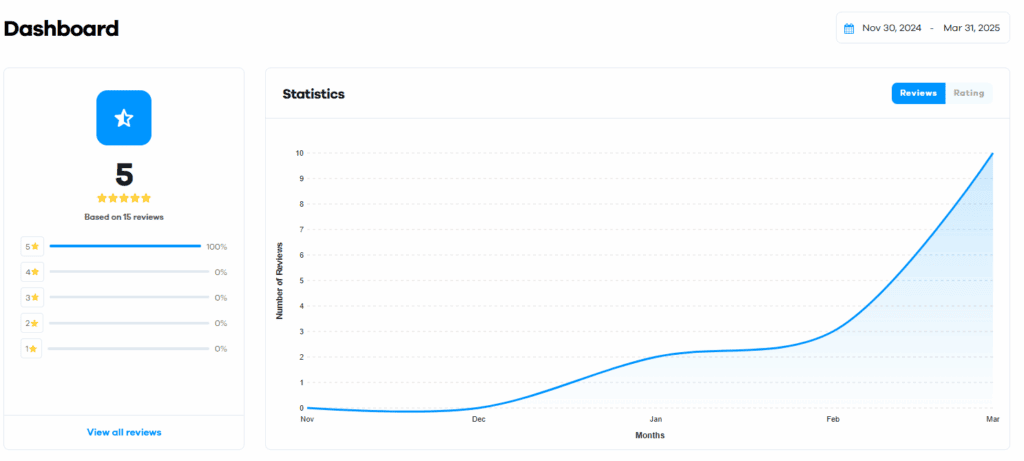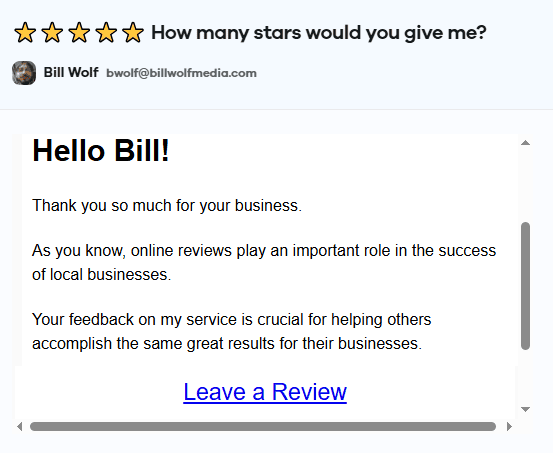You need excellent customer reviews, and you need them now. That’s because around 90% of potential customers will read customer reviews about a business online, whether in a blog, in Google search results, or on social media before buying a product or service. So how do you ask customers for reviews?
It’s not rocket science. People trust businesses other people trust. Think about it for a second. If you were a homeowner seeking the services of a contractor, you’d only trust plumbers, contractors, etc., who have a proven record of being great at what they do.
Positive reviews can be your best sales tool for pulling in new customers. Negative ones, however, can drive them straight to your competitors if they’re not handled with care.
I have been helping businesses build credibility using customer reviews since 2019. I’ve seen the good, the bad, and the really ugly. Let’s dig into how to ask customers for reviews the right way.
The Value of How to Ask Customers for Reviews
I’ve met dozens of business owners who were skeptical about requesting reviews from their customers and hesitant to embrace the truth that reviews are the real deal.
One of my early SEO clients didn’t see the value in online reviews. He’d often express his frustration to his circle by saying, “Fuck Bill,” when his business wasn’t gaining traction. The situation worsened when he changed his business address, leading to a drop in trust from Google. After finally embracing the importance of reviews to complement the fantastic digital presence that I built for his company, he amassed over 175 glowing reviews and absolutely crushed all of his sales goals.
His small business grew to a place where he was finally able to hire a general manager and do whatever he wanted with his time.
He later admitted, “I’d be ten times further along if I’d just listened to you from day one.”
So I’ve written this guide to help you with one of the most important aspects of running a local business. Let’s dive in so you can learn how to ask customers for reviews too!
Table of Contents
Why Customer Reviews Matter
Everyone you know wants to feel safe. However, true safety only exists within the confines of the familiar.
That is to say: we will most likely feel a lot safer around people, places, and businesses we are familiar with, especially online.
It is unlikely that you would accept a friend request from a suspicious account that you share no mutual friends with on social media. That’s because that friend request is not familiar.
However, if said account gets a couple mutual friends who you trust, you’d become more open to engaging with them.
Sort of like saying: “If my trusted friends trust this person, then they are likely not a fraud or scammer.”
Similarly, it is unlikely that you would buy a product you’ve never heard of without first seeing what others think of said product.
When dealing with unfamiliar products and services, potential customers trust the words of other customers who leave reviews.
Nielsen’s Global Trust in Advertising report data indicates over 90% of customers place as much weight on a positive review as they would a personal recommendation from a friend or family. They should!
Nobody should waste their money on products or services that aren’t worth it.
Where Should Your Business’ Reviews Appear?
Where your reviews appear truly matters.
While it is ideal to get as many reviews as you can across all social media, getting reviews on Google is the real deal for most businesses.
This is because most potential customers search Google first when looking for a service or product. And they dig into what the Google reviews say.
People trust Google. If Google says you’re a trustworthy business, your future customers probably will too.

Here are a few platforms where a review would be ideal and why. Bear in mind that this is very dependent on the nature of your business.
| Platform | Pros | Cons |
| Google (Google Business Profile) |
|
|
|
| |
| Yelp |
|
|
| Industry Specific Platforms |
|
|
Timing is EVERYTHING: When to Ask for a Review
First things first: you don’t have to nag customers for them to leave reviews about your business online.
A lot of customers already want to give reviews. Up to 47% of customers admit to posting reviews every month, many of whom haven’t been asked to do so.
Your approach to how to ask customers for reviews is important. You are at risk of losing them when you ask for a review too often, too early, or too late.
That pressure is going to do the opposite of what you expect. Rather than make them receptive, it will make them feel unsafe. They may even begin to question their decision to have purchased a product or service from you.
Rather than nag, let everything unfurl naturally.
Let the customer tell you (or hint at) what a great experience they have had with you. And when they do, you should subtly mention how much you’d love for them to share their positive feedback online.
One trick that has worked for my clients has been making a review request while a customer still has some paperwork left to complete.
My clients might say: “Hey, while I am finishing up this warranty card for you, would you mind leaving a review online for me?”
Then they text over a link to the customer with my review software.
The point is: you are likely to get a review when you request one around the time when a customer has become comfortable with you and is thrilled about your service.
Embrace The Ask: Ways to Approach Asking For A Review
You can be direct or passive, but be sure to make the customer feel like they are doing you a favor.
With the direct approach, you ask for a review directly. Straight up. You use this approach with customers who have been consistent with giving you positive feedback over time. Their consistent feedback suggests that they might like you enough to spread the word about their positive experience with you.
With the passive approach, on the other hand, you casually mention how much customer feedback helps your business grow.
Depending on the relationship you have with the customer, either one works great.
You can send your review requests via email, texts, or even with a QR code on a printed receipt.

You can also create a link that takes customers to all of your review site profiles!
The point is to make the process of leaving a review as simple as possible.
Remember, the more trust you build, the more opportunities you will have to get positive reviews.
Keep Your Review Requests Short & Sweet: Less is More
Since the goal is to build trust, be conversational when requesting a review. You don’t want to sound like a robot or a bossy business owner.
Keep your review requests short, simple, and very polite.

You can say something along the lines of:
- “Hey, (name), I’m glad you had a good experience. Would you mind sharing a review here on Google or the BBB?”
- “So glad to hear you had a good time at our restaurant the other night. If you wouldn’t mind, could you please leave a review? Our business really appreciates you.”
- “<Name>, I hope I didn’t keep you waiting long. Here’s a card with our information. Reviews help us get the word out, and we would sure appreciate you taking a minute to rate us.”
Notice how those requests offer the customer the chance to say yes or no? Usually, when you give people the chance to make choices, they’re likely to give you a favorable response.
Also, don’t forget to respond when your customers write a review for you. Showing appreciation can go a long way in building customer loyalty and encouraging future patronage.
The Other Way to Ask for Reviews (Ethically)
Look, you know your customers are busy. Even the happiest ones sometimes forget to leave a review simply because life gets in the way. That’s why it’s tempting to offer an incentive. But here’s the truth: offering rewards in exchange for reviews is now officially illegal according to updated FTC guidelines.
Yes, even if the review is honest.
Platforms like Yelp and Google also have strict policies that prohibit incentivized or filtered reviews of any kind. Offering cash, gift cards, free services, or anything else of value in exchange for a review is a total no-go.
You also can’t engage in review gating: the act of discouraging negative reviews.
Violating these rules can get your business profiles publicly flagged or suspended. I’ve even witnessed entire review profiles wiped out because of shady tactics.
So what can you do? Learn how to ask for customer reviews ethically.
Make it easy. Make it personal. Make it matter.
- Easy: Give customers a link that takes them to their preferred review site. Don’t make them search for you.
- Personal: Mention their specific experience in your ask: “It means a lot to us to hear what stood out to you.”
- Meaningful: Let them know how their review helps not just you, but other customers like them. You’re building an online reputation rooted in trust.
If you want to “sweeten the deal” without violating rules, here’s one ethical option on how to ask customers for reviews:
Run a general thank-you giveaway.
I’ve personally gotten quite a few great reviews with this simple tactic.
You can say something like, “We’re running a giveaway this month to thank our community – no strings attached. Just follow us and stay tuned! And if you want to help spread the word about our <specific service> company, we would really appreciate it if you left a review about your experience with us.”
That way, you’re building goodwill without tying the reward to any specific action.
A simple social media post asking for online feedback can go a really long way!
Don’t be Afraid to Follow Up… Gently
It doesn’t always work the first time you ask. Customers can forget or feel hesitant.
It could be anything, really.
Whatever the case, it is a great idea to follow up on your initial request for a review. You can use email, social media, or telephone calls as your follow-up channels.
The more casual, fun, and engaging you make the follow-up message, the better. Act natural and be engaging.
“You had service with us on May 18th, 2025 and I wanted to check in to ask what you thought of our service?”
“Thank you for your business. Feel free to share a review about your experience with us. We appreciate you!”
Note that you do not have to follow up too soon. You can give it a few days.
Avoiding the Review “Faux Pas” (What Not to Do)
Some ‘expert’ advice online will wreck your credibility. These are the biggest mistakes that will kill your trust fast.
These are the red flags to look out for:
- Never pay for reviews. It’s heinous, wrong, and you will get caught!
- Avoid SEO firms using black-hat tactics. If you use SEO copywriting services and suspect the SEO company might be bringing you shady reviews, it’s time to run.
- Never write your own reviews! It’s simply not worth the risk. An overload of overly positive feedback can raise red flags and make potential customers suspicious.
Customers can sense a fake review written by a business owner or employee a mile away. Don’t risk your reputation over the desire for quick results!
Review Request Concerns
A lot of business owners hesitate to ask or learn how to ask customers for reviews because they’re afraid of negative feedback.
But here’s the thing: even bad reviews are a gift.
They mean someone cared enough to share their experience, and that gives you a chance to respond, improve, and turn the situation around.
I’ve seen angry customers become loyal advocates just because a business owner took their feedback seriously and made it right.
When you respond with professionalism and a willingness to fix things, you can not only win that customer back, but you also show future customers that you give a damn.
By acknowledging negative reviews and committing to a culture of consistent improvement, you can become better at what you do.
And in the home services industry, that kind of trust is everything.
FAQs: How to Ask Customers for Reviews
How can I get reviews for my new business?
I get asked this all the time. The answer is simple: get customers.
You need customers to get reviews.
If you aren’t getting any customers right now, here’s how to ask customers for reviews:
- Be a part of your community: knock on your neighbors’ doors. Introduce yourself. Smile. Shake their hands. Tell them what you’re doing and ask if they have any problems that you can solve.
- Partner with a related business: if you’re an HVAC guy, partner with a plumber. Partnerships can get you customers fast.
- Run ads or join a lead generation site in your niche: for home service providers, HomeAdvisor is a good start.
Should I use review generation software?
Ah, yes. Technology has brought us many innovative ways to maximize results.
However, you don’t have to cheat. There should be no review gating (avoiding negative reviews), period.
I have review software that is super easy to use and has helped clients get dozens of reviews within months, not years. And I don’t encourage my clients to cheat.
What if my customers aren’t tech-savvy?
Give them a step-by-step printed card or send a simple link by text. Better yet, walk them through it on the spot all the way up to the point that they’re ready to leave a rating and start typing. Make it easy.
How many reviews do I need to rank on Google?
Typically, businesses start to notice a real change in organic traffic after they naturally hit the 10 review mark on Google.
That’s what all the top researchers say anyways, and that’s also been my observation with my clients.
That doesn’t mean get 10 reviews and stop. Review recency is a huge ranking factor, so it’s important to continue to get them over time.
What if I get ghosted after asking?
It happens all the time!!! If somebody said they were going to leave you a review, casually follow up one time. Sometimes Google’s filter will automatically hold or block certain reviews.
It’s a numbers game, and you’re better off pursuing new customers than you are hounding the ones you already served.
Mastering How to Ask Customers for Reviews
There you have it: understanding the fine art of knowing how to ask customers for reviews isn’t difficult when you know what to avoid.
The bottom line: authenticity wins.
Put yourself in a customer’s shoes. Make the ask at the right time, stay real, and you’ll build a steady stream of reviews that truly reflect the value you provide.
If the experience they had with your business was truly all that and a bag of chips, then they’ll jump at the chance to share their glowing feedback in the form of a 5-star review.
And if not, at least you’ll get some actionable feedback to help you make your business better.
Good luck on your review request journey!
Need help setting up review requests for your business?
Shoot me a message. I’ll walk you through a no-BS setup that actually gets results.
